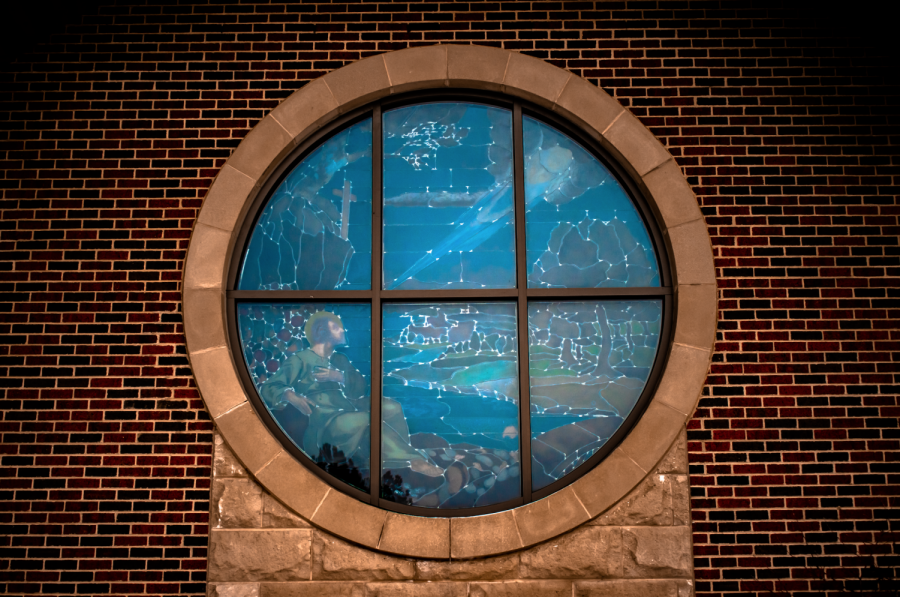Throughout the past year, the world has learned – arguably more than ever before – the importance of historical reflection and recognition of systematic societal inequalities.
As a Jesuit institution, Marquette is grounded in ideals of “cura personalis,” justice, education and service, concepts well explored in classes.
But these same ideals were also utilized in early missionary work that contributed to colonization in communities around the globe.
Conversations about the history of missionary work by any religious order are complex, especially when considering the ways in which approaches have developed since early missions centuries ago. Questions of morality of actions, as well as one’s purpose and place in the world emerge. Navigating these questions both in context of global religion, as well as on Marquette’s campus, in no way yields easy answers given its intricacies.
Historical Foundations
Ignatius of Loyola founded the Jesuit movement in Spain in 1534, and together with six of his students took vows of poverty and chastity as they pursued their plans for converting Muslims. The Turkish Wars kept them from traveling to Jerusalem, and instead they found themselves on their way to Rome to seek permission to form a new religious order from the pope. Pope Paul III approved the order in 1540, and the Society of Jesus was founded.
The Order of Jesus was later dissolved in 1773 by Pope Clement XIV as it was suppressed as nationalism rose in Europe. Nearly 40 years later the order was re-established under Pope Pius VII.
The Society of Jesus sent missionaries around the world in hopes of converting people to Catholicism and played an integral role in the Counter-Reformation. Ministries traveled to India, Brazil, the Congo, Ethiopia, China and the United States, among other countries.
The Jesuit order was just one among many religious sects to travel the world for missionary work. Jesuit missionaries’ efforts were particularly effective, says Lee Palmer Wandel, professor of history with an emphasis in Christianity at the University of Wisconsin-Madison. She says Jesuits moved by “propagating faith” and began their missionary work in the lowlands of Germany and England, “restoring” European Christians during the Counter-Reformation.
The Jesuit order saw their missionary work as saving souls, and saw Christianity as the true religion, Wandel says. What gets lost in many narratives, she says, is that the Jesuits never saw missionary work as a political move, whereas other sects did.
Early Jesuit missionary work differed from other missionary efforts in many ways. Most notable, perhaps, was the Jesuits’ efforts to get to know the communities in which they were working. Missionaries made efforts to take on the hardships of those they were working with, and particularly in Indigenous communities of the U.S., missionaries took the time to learn the language and customs, says Father Michael Maher, associate professor at Marquette and pastoral minister in Wells Street Hall.
The guiding principal to Jesuit missions is the aim to bring people closer to God, and without this principle a mission can’t truly be Jesuit, Fr. Maher says.
“The ultimate goal of a Jesuit mission is how do we understand creation in so far as it helps us move towards God,” Fr. Maher says. “Individual missions, then, are adapted to how well we can understand and talk about that task in different societies.”
Jesuit missions operated with the Spiritual Exercises as its core, Wandel says. Every missionary was trained in these exercises, in an effort that was much more intense than other orders. This core served as a connection between all missions, even if they looked different within countries around the world.
Among orders, missions differed based on their ideas of holiness. For Jesuits, their missions were based off of Franciscan ideals, such as charity, benevolence and selflessness. This is where Jesuits drew their commitment to taking on poverty, Wandel says.
She says that these fundamental differences in the Jesuit order, as opposed to other orders, largely comes down to when the order began.
“The Jesuits were founded after Europeans had set foot in the Western hemisphere, so they were conceived in a radically different way,” she says.
Moral Qualms Then and Now
While the Jesuit order made efforts to integrate themselves into the communities that they converted, this does not remove them from the implication of colonization. These missions of conversion hold a complicated history. Missions, based in any religion, are deeply tied to colonization, and in the case of the U.S., to the genocide of Indigenous people.
In many cases of religious colonization, conversion was involuntary, often times forced and in violent ways, says Bryan Rindfleisch, assistant professor of history at Marquette. However, Jesuit missionaries were quite unique, he says, in their efforts to learn Indigenous languages to communicate and integrate into native communities. In this way, Jesuits were able to convince Indigenous people, rather than force them, to give up their identities and lives.
“The Jesuits, still in the endgame, they demanded that you become Christian on their terms,” Rindfleisch says. “But at the same time, learning the language, ingratiating yourself with the community, was a very different way of missionizing than all of the other sects.”
Fr. Maher says the job of a missionary is to align human experience with the insights of faith. Some missionaries – across faiths and sects – he says, did a good job of this while others simply threatened, and missionaries often fell along a spectrum.
It is important to note that this place on the spectrum, Fr. Maher says, is not a problem of missionaries, but rather a universal problem of human pride and stubbornness.
“We can’t look at missionaries as one type of person that is trying to push an idea, while everyone else is neutral,” Fr. Maher says.
Often when talking about such topics like colonization, there is a push to view historical events as a product of their time. However, Rindfleisch says, the moral qualms we see and have today are just the same as they were back then. While some missionaries had ill intent, many felt they were truly helping. But, through his experience reading historical documents, Rindfleisch says he can see that missionaries still struggled with the morality of what they were doing.
Wandel echoes this sentiment, saying that there was always a choice of actions. Between and among orders, there were both people that fought with and against acts of violence or injustice. While missionaries at least saw communities they interacted with as essentially human and thus fought for them, many missionaries may still have seen them as “savages” or primitive, she says.
“Some chose to ally with colonizers and some chose to actively resist,” Wandel says.
Wandel does note that among the Jesuit order, while some signed onto brutalities such as slavery, not many did. The Church, of course, very much can be a source for social justice, she says.
These issues, Wandel says, in some ways come from the multitude of ways that the Bible can be interpreted, which speaks to the richness of the text. In theory, everyone has the same text, and yet there is such a spectrum within and beyond the Catholic Church of what people get from it, she says. From those interpretations, people can find support for a range of actions.
“Those who want to take up the sword, it’s there. Those who want to work through God’s love, it’s there,” she says. “People hear different things, but all feel they have heard the truth.”
Wandel notes, also, that the controversy of missions in some ways stems from their basic motive.
“Missions are built in this idea that ‘I have something that is true, and I will get you to see that truth.’ And that’s where criticisms come in,” Wandel says.
Missionaries generally aimed to strip native populations of their identity and culture, which has left a long-lasting impact, says Rindfleisch. Native populations could be persecuted in the U.S. for practicing their own religion until 1978. Religion is deeply rooted in language, and as the number of people that can speak native languages continues to decrease, many religions are on the boarder of becoming extinct, he says.
With this continued impact on native populations and the relative recentness of many liberations of these populations, reconciliation is a long and painful road. And with the added long history of white supremacy in the U.S., as well as the country’s unique distaste in addressing its past, Rindfleisch says he isn’t confident the U.S. will ever see reconciliation.
“Something that the United States just has about itself, I don’t want to say it’s peculiar to the United States, but there’s an aversion to the truth of the past,” Rindfleisch says.
Other countries, such as Canada, have started this path to resolution and in places like New Zealand, other Indigenous communities have been brought to the forefront. But with the historical erasure of Indigenous people in the U.S., reconciliation has not really begun.
“Those communities have more aboriginal presence both in the history textbooks, the education system, but also in politics and visibility that you don’t see in the United States, because we don’t really want to confront what happened,” Rindfleisch says.
Reconciliation and rehabilitation, says Rindfleisch, takes years and years of painful dialogues.
This story was written by Amanda Parrish. She can be reached at [email protected].
This is the first installment in the Marquette Journal’s series “Inquiring Ignatius.” The following installments will appear in the Marquette Tribune and on Marquettewire.org.


